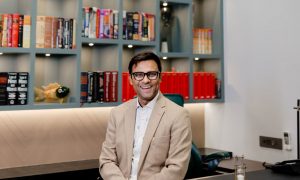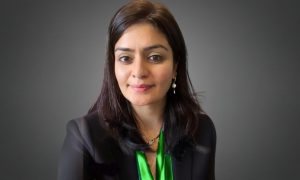This interview has been published by Priyanka Karwa and The SuperLawyer Team
Aashdin, it’s a pleasure to have you featured. To start, could you share a bit about yourself and your journey, from your law school days at Mumbai University to becoming a seasoned Principal Associate at Argus Partners?
Like many other emerging professionals, I too grew up in a humble background facing initial hardships. It is at those nascent stages that I found my strength and learned to transform my challenges into opportunities. Growing up, I was always taught to appreciate and value hard work.
Soon after I graduated with B.A. (Psychology) degree from Mumbai University, my journey to become a successful lawyer began. It was with rigorous years of learning which included full day internships at the chambers of prominent counsel in Mumbai.
The practical experiences that I was exposed to during my internship days were intense and overwhelming. Every day, after attending lectures in college (where I met my better half), I would reach the chamber of my senior where I was required to immerse myself in the intricacies of various statutes, legal precedents, and legal theories. I was encouraged by my senior to engage with him in brainstorming sessions and provide legal research which for me at the time seemed very complex.
Upon receiving my law degree, the journey transitioned into a more professional realm as I embarked on a path of building a career as a successful lawyer. My early years as a lawyer were at HSA Advocates, where I got the opportunity to enhance my skills through research, drafting, and courtroom experience under guidance from my seniors.
After spending about half a decade at HSA Advocates, the team along with me, advanced to Argus Partners.
My journey as a lawyer is in progress as I continue to learn from my seniors and juniors. I am grateful to them as they continue to contribute to a career which I absolutely love.
Your career spans over a decade, with notable experiences at HSA Advocates and now at Argus Partners. Can you reflect on some key milestones or cases that have played a significant role in shaping your expertise in dispute resolution and litigation?
Every experience throughout my career has contributed towards my professional and personal growth. While some were joyous, others challenging, but each one of them have shaped my progress in the profession.
While I have been part of and contributed to a few significant cases which may be remembered as an important event, some of my notable experiences were created at the time of preparation and strategizing for hearings at conferences with counsel and colleagues.
Representing clients in cases which are unusual, coupled with the uncertainties connected with litigation, provide for an exciting sense of anticipation which I absolutely yearn for. While my professional journey has included diverse areas of law ranging from, suits for defamation, specific performance of contracts, varied commercial disputes, company petitions for oppression and mismanagement, Insolvency and Bankruptcy laws, laws relating to intellectual property, eviction cases to rent control measures, guardianship petitions and arbitrations including execution petitions, each aspect and involvement has had a significant role in shaping my skill in dispute resolution and litigation.
A few of my experiences which I can recall at this moment, was my first reported case during my initial years at HSA Advocates in which I appeared (of course along with a prominent senior counsel and a well-known advocate from Goa) before the Bombay High Court at Goa. I remember the arguments that took place in court like it was yesterday. This was a case which emerged from an order of the Company Law Board and was an appeal under section 10-F of the Companies Act, 1956 which dealt with the law relating to the provisions of the Limitation Act, 1963 and the Depositories Act, 1996.
Another significant decision given by the Madras High Court, that I can recall, is whereby the High Court held that the mandatory time limit of 120 days to file a written statement in a commercial suit is not applicable to a written statement to a counterclaim. This issue was undecided by a court previously and the arguments and preparations that went in this case were interestingly exhilarated which led to a successful outcome for our client.
Recently also, before the National Company Law Tribunal at Mumbai I was fortunate to have appeared in cases whereby legal aspects of the Insolvency and Bankruptcy Code, 2016 were examined and with the help of judicial precedents the cases led to a successful and logical conclusion.
All that said, I must acknowledge that the key milestones achieved by anyone, either professionally or in the personal chapter is a culmination of a dedicated team effort.
These experiences and milestones have collectively created a mosaic of memories that define my identity and contribute to the richness of my professional experience.
In addition to being a dedicated attorney, you hold a bachelor’s degree in psychology. How has your background in psychology influenced your approach to legal matters, especially in dispute resolution?
I had never thought that after completing my majors in psychology, I would embark upon a journey as a lawyer.
Though, in my years of practice, I have realised that psychology and law intersect in various ways.
Understanding psychological factors of your clients can often be valuable in considering or deciding an appropriate approach towards your clients’ needs and achieving the desired outcomes in a case.
With the increase in litigants and individuals opting for alternate dispute resolution methods, applying psychological principles become important especially for arbitrations, mediation, negotiations and conciliation in order to effectively facilitate communication and resolution between parties.
The integration of psychology and law has enhanced my understanding of human behaviour and decision-making which ultimately lead to more informed and just legal outcomes.
Your commitment to pro bono work and legal education initiatives is commendable. Can you share a specific instance where your pro bono services made a significant impact on someone’s life, and how did it shape your perspective on the role of legal professionals in society?
I was always encouraged to take up pro bono work as a budding lawyer and made to understand that lawyers should contribute their expertise to help people who might not otherwise have access to legal services. This would help me build an ethical practice in the years to come.
I can recall a few instances, one of which was when I advised a security guard and assisted him to recover his dues from his previous employment while on another occasion, I advised an elderly person from a chawl regarding a dispute with the developer relating to an alternate accommodation.
I believe that pro bono work is essential for every professional to contribute towards the community which helps support the disadvantaged and creates a sense of morality and integrity amongst the public and uplifts the status of this profession.
Having worked on both civil and criminal matters, is there a legal area that you find particularly intriguing or intellectually stimulating? What aspect of your work keeps you motivated and passionate about the legal profession?
There is no particular legal area that I find more intriguing or intellectually stimulating than the other as both these practice areas are distinct, each dealing with different types of cases, legal issues, and consequences. I find both equally stimulating and fascinating.
While the majority of my practice area involves civil law, there are a slight number of matters that I take up under criminal law too. Therefore, my focus as a lawyer practicing mainly under civil law, deals with resolving disagreements between the parties, suggesting and advising on the remedies available to my clients.
Being mindful about what the outcome of a civil case or a criminal case could be is crucial for legal professionals and individuals involved in legal matters.
What drives me about the legal profession is the complexities and dynamic nature of law which is constantly evolving be it through legal precedents, social and cultural changes or otherwise.
In your role at Argus Partners, you’ve been involved in a diverse range of matters, from civil and criminal cases to insolvency and arbitration. What aspects of these areas do you find most challenging and rewarding, and how do you approach them?
Though mainly my practice areas involve civil litigation and a small amount of white-collar crime proceedings, I also represent financial institutions and asset reconstruction companies before the National Company Law Tribunal across the country. Each of these practice areas pose different challenges which depend on the peculiar facts of each case. Similarly, as every individual is different and has their own traits, the cases that a lawyer is engaged for are also distinct from each other, therefore applying the law on facts of those cases can be challenging and the ability to do that is rewarding.
Each case must be approached with an open mind and accepting of the possible outcomes with the purpose of providing the best possible resolution to your client.
Beyond your professional pursuits, are there personal interests or activities that contribute to your growth and well-being? How do you manage the demands of a challenging legal career while ensuring personal enrichment?
Well, I have never thought of keeping a boundary between my professional and personal life. I believe that my professional pursuits are very much aligned with my personal interests and passions.
I find it natural that my personal and professional life is integrated in such a way that my professional success ensures personal enrichment.
I know of many professionals that find it challenging to compartmentalize their personal and professional lives, especially if work demands spill over into personal time or when personal issues affect their professional performance – thus, time management and self-awareness is crucial in such situations. However, I believe that being a professional is a full-time job and thus integrating it with your personal life can lead to a fulfilling lifestyle.
With that said, I must add and appreciate that right from my formative years as a lawyer, my seniors have always provided a flexible work environment allowing me to blend my personal and professional responsibilities.
As someone who provides free legal services and encourages students to uphold constitutional values, what advice do you have for young law students aspiring to make a positive impact in the legal field?
From my experiences I have noticed that quite often people have preconceived opinions about individuals based on stereotypes. As lawyers, I would recommend that every young law student aspiring to be a lawyer inculcates principles of equality and ensures that every person who approaches them for their legal advice or assistance on any matter, should be treated fairly and without discrimination.
It is necessary that every individual aspiring to make a positive impact upholds ethical standards and learns from mistakes and challenges, using them as opportunities for personal and professional development rather than being deterred and feeling dejected.
As a student, it is vital that you choose a specific area of law that aligns with your passion and interests. You need to stay informed about changes in the legal landscape, recent case law, and emerging legal trends.
Dedicate some time to pro bono cases, maintain a reputation for honesty and fairness as that will contribute to your long-term success.
Get in touch with Aashdin Chivalwala-
























